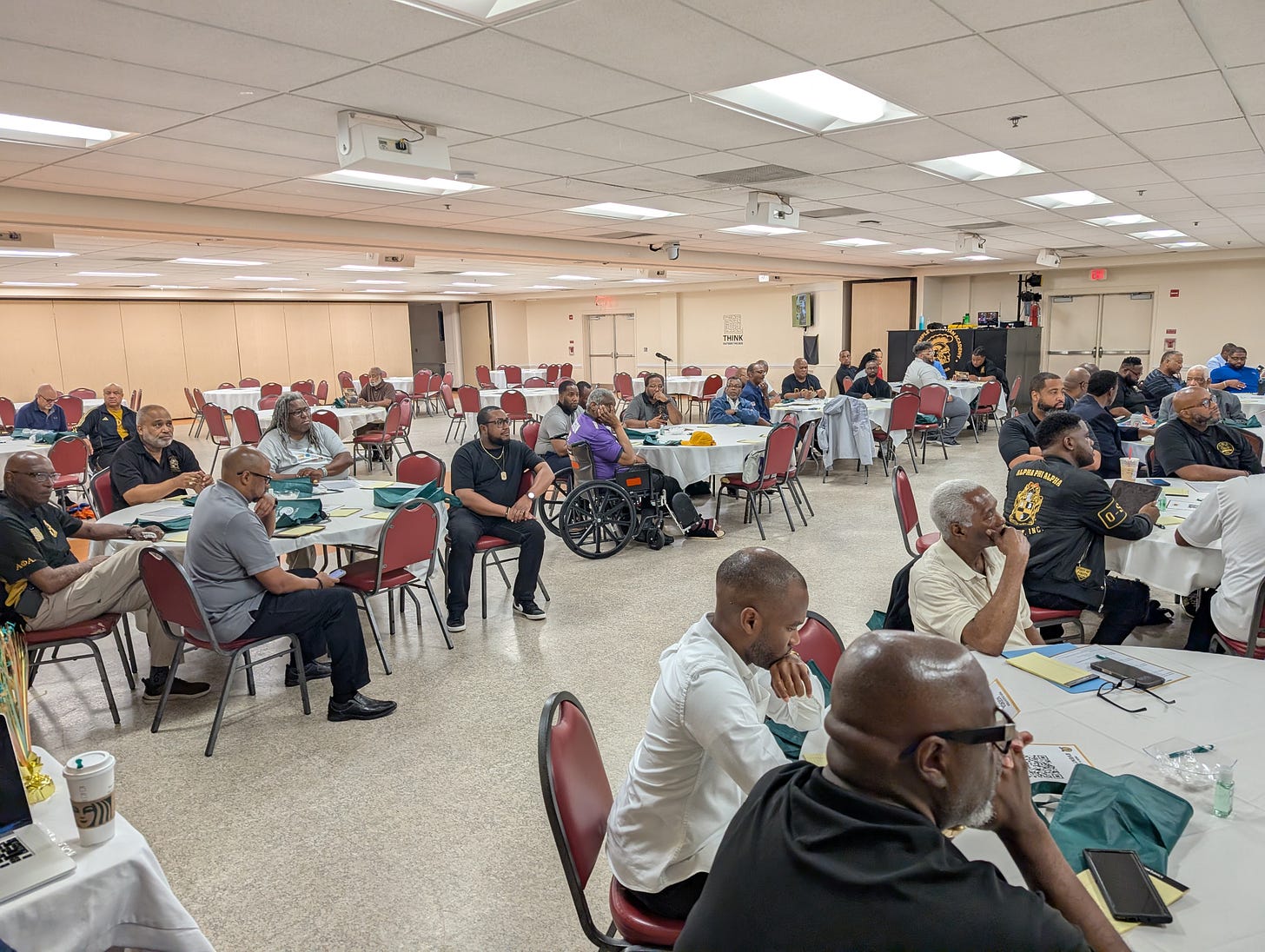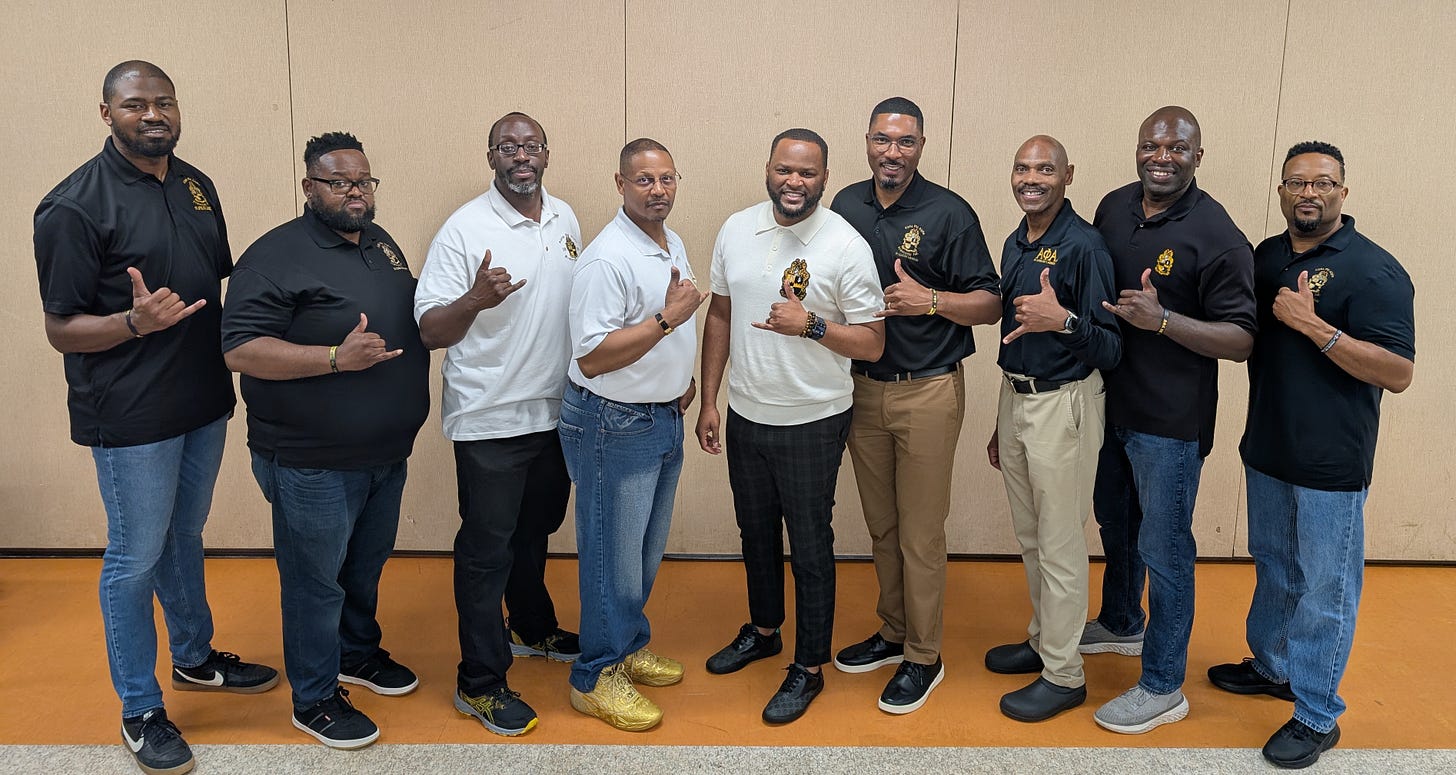The Pi Upsilon Lambda Foundation Men's Health Forum
Where We Work, Pray, and Play: Reclaiming Men's Health through Environmental Justice
Where We Work, Pray, and Play: Reclaiming Men's Health through Environmental Justice
By Dr. Okey K. Enyia
On Saturday, June 7, I had the honor of moderating the opening panel at the 2025 Men’s Health Forum hosted by Alpha Phi Alpha Fraternity, Inc., Pi Upsilon Lambda Chapter, and its Charitable Foundation. Held at Reid Temple A.M.E. Church in Glenn Dale, MD, the forum brought together community members, students, faith leaders, and health professionals for a deep and urgent conversation: The Impact of Environmental Health and Justice on Men’s Health.
The theme—“Where We Work, Where We Pray, Where We Play”—was more than a tagline. It was a framework for reimagining how we invest in Black men’s wellness across the full spectrum of our lived environments. From contaminated air to food deserts, from disinvestment in schools to unequal access to care, our panel unpacked how structural conditions shape whether we survive or thrive.
Panel 1: Laying the Foundation for Health Justice
I had the privilege of moderating a dynamic and wide-ranging panel featuring:
Dr. Ifeanyi Olele, Psychiatrist
Ms. Amera Bilal, Prince George’s County Department of Family Services
Dr. Sacoby Wilson, Environmental Justice Scholar, University of Maryland
Dr. Lassiter Speller, Eastern New Mexico University
We explored the connections between trauma, place, policy, and prevention—calling attention to how public health must move upstream. The audience came ready with thoughtful questions, reflections, and stories of lived experience. Several attendees expressed that this was the first time they’d heard men's health discussed in the context of environmental justice and racial equity.
Spotlight on Prostate Cancer: A Crisis in Black Men’s Health
Later in the program, we turned our focus to one of the most pressing health disparities facing Black men today: prostate cancer. This segment, led by the Prostate Health Education Network (PHEN), was one of the most personal moments for me.
Why? Because my father and three of my uncles are all prostate cancer survivors. Their strength—and the silence they had to break through to get the care they needed—continues to motivate my advocacy. I’ve seen firsthand how early detection can save lives, but only when our communities are equipped with culturally relevant knowledge, access, and trust.
Here’s what PHEN wants us to know:
Black men are 1.7 times more likely to be diagnosed with prostate cancer than white men.
We are 2.1 times more likely to die from the disease.
Early detection through routine PSA screening is one of the most powerful tools we have—but stigma, access barriers, and mistrust too often stand in the way.
At the forum:
Survivors Dr. Artie Shelton and Dr. James Smith shared compelling testimony that was both educational and empowering.
One-on-one consultations were available.
We offered free PSA screenings, thanks to a partnership with the Howard University Cancer Center.
This wasn’t just about raising awareness. It was about reclaiming agency.
Tools for Better Living
In addition to powerful conversations, participants walked away with tangible tools:
1. Food is Medicine – A Men’s Health Nutrition Guide
Simple swaps—like choosing oats with berries instead of sugary cereal, or whole grains instead of white bread—can reduce the risk of chronic diseases that disproportionately affect Black men, including heart disease and diabetes.
2. Grow Strong: Gardening to Support Men’s Health
Gardening was reframed as a strategy for wellness—not just physical, but emotional, social, and even cognitive. It’s a low-cost, high-impact tool for stress relief, purpose, and connection.
3. Resources from PHEN
Educational materials on prostate health, survivorship, and screening helped normalize life-saving conversations—especially in spaces like barbershops, churches, and fraternities where trust already exists.
Why This Matters
Men’s Health Month gives us a spotlight—but our lives require sustained illumination. If we want to close the gap in life expectancy, we must treat men’s health as a justice issue. That means disrupting systems that fail us, investing in spaces that heal us, and empowering each other to act boldly—whether that’s asking our doctor for a PSA test, starting a garden, or checking in on a brother who’s been silent too long.
I’m proud to be doing this work—professionally and personally.
Later this year, I’ll be releasing the John Henry Health Equity Playbook: A Four-Year Policy Agenda for Black Men, which builds on forums like this one to offer policy solutions grounded in lived experience and evidence-based practice.
Because we can’t just talk about men’s health—we have to fight for it.
📍Hosted By:
Alpha Phi Alpha Fraternity, Inc. | Pi Upsilon Lambda Chapter
Pi Upsilon Lambda Charitable Foundation
In partnership with Reid Temple A.M.E. Church, BLACC, and the Prince George’s County Council
📸
🔗 Learn more about PHEN’s work: www.prostatehealthed.org
🔗 For tools and tips, visit www.eatright.org
✍🏾 Want more content like this? Subscribe for policy insights, health equity strategy, and advocacy tools to help you shape the future.



